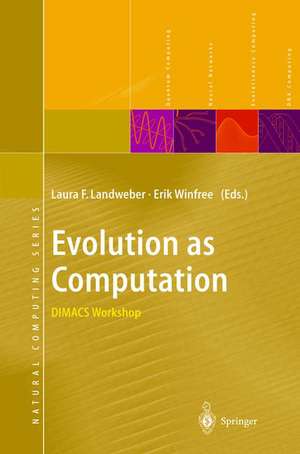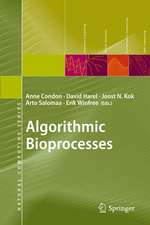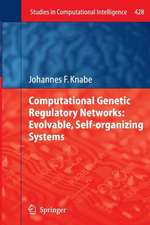Evolution as Computation: DIMACS Workshop, Princeton, January 1999: Natural Computing Series
Editat de Laura F. Landweber, Erik Winfreeen Limba Engleză Hardback – 27 noi 2002
| Toate formatele și edițiile | Preț | Express |
|---|---|---|
| Paperback (1) | 635.15 lei 6-8 săpt. | |
| Springer Berlin, Heidelberg – 22 dec 2012 | 635.15 lei 6-8 săpt. | |
| Hardback (1) | 642.92 lei 6-8 săpt. | |
| Springer Berlin, Heidelberg – 27 noi 2002 | 642.92 lei 6-8 săpt. |
Din seria Natural Computing Series
- 20%
 Preț: 544.29 lei
Preț: 544.29 lei - 20%
 Preț: 305.90 lei
Preț: 305.90 lei - 20%
 Preț: 972.14 lei
Preț: 972.14 lei - 20%
 Preț: 617.13 lei
Preț: 617.13 lei - 20%
 Preț: 632.40 lei
Preț: 632.40 lei - 20%
 Preț: 629.65 lei
Preț: 629.65 lei - 20%
 Preț: 977.81 lei
Preț: 977.81 lei - 18%
 Preț: 944.07 lei
Preț: 944.07 lei - 20%
 Preț: 641.95 lei
Preț: 641.95 lei - 20%
 Preț: 615.69 lei
Preț: 615.69 lei - 20%
 Preț: 632.58 lei
Preț: 632.58 lei - 20%
 Preț: 627.24 lei
Preț: 627.24 lei - 20%
 Preț: 641.78 lei
Preț: 641.78 lei -
 Preț: 376.97 lei
Preț: 376.97 lei - 20%
 Preț: 639.35 lei
Preț: 639.35 lei - 20%
 Preț: 636.14 lei
Preț: 636.14 lei - 20%
 Preț: 324.09 lei
Preț: 324.09 lei - 20%
 Preț: 321.49 lei
Preț: 321.49 lei -
 Preț: 381.87 lei
Preț: 381.87 lei - 20%
 Preț: 631.62 lei
Preț: 631.62 lei - 20%
 Preț: 327.16 lei
Preț: 327.16 lei - 20%
 Preț: 1272.95 lei
Preț: 1272.95 lei - 20%
 Preț: 517.81 lei
Preț: 517.81 lei - 20%
 Preț: 635.00 lei
Preț: 635.00 lei - 15%
 Preț: 626.97 lei
Preț: 626.97 lei - 20%
 Preț: 322.43 lei
Preț: 322.43 lei - 20%
 Preț: 644.51 lei
Preț: 644.51 lei - 20%
 Preț: 645.97 lei
Preț: 645.97 lei - 20%
 Preț: 977.35 lei
Preț: 977.35 lei - 20%
 Preț: 498.33 lei
Preț: 498.33 lei -
 Preț: 392.79 lei
Preț: 392.79 lei - 20%
 Preț: 640.16 lei
Preț: 640.16 lei - 20%
 Preț: 308.60 lei
Preț: 308.60 lei - 20%
 Preț: 640.80 lei
Preț: 640.80 lei - 15%
 Preț: 638.99 lei
Preț: 638.99 lei - 20%
 Preț: 329.76 lei
Preț: 329.76 lei
Preț: 642.92 lei
Preț vechi: 803.64 lei
-20% Nou
Puncte Express: 964
Preț estimativ în valută:
123.05€ • 129.10$ • 102.08£
123.05€ • 129.10$ • 102.08£
Carte tipărită la comandă
Livrare economică 29 ianuarie-12 februarie 25
Preluare comenzi: 021 569.72.76
Specificații
ISBN-13: 9783540667094
ISBN-10: 3540667091
Pagini: 352
Ilustrații: XV, 333 p.
Dimensiuni: 155 x 235 x 27 mm
Greutate: 0.71 kg
Ediția:2002
Editura: Springer Berlin, Heidelberg
Colecția Springer
Seria Natural Computing Series
Locul publicării:Berlin, Heidelberg, Germany
ISBN-10: 3540667091
Pagini: 352
Ilustrații: XV, 333 p.
Dimensiuni: 155 x 235 x 27 mm
Greutate: 0.71 kg
Ediția:2002
Editura: Springer Berlin, Heidelberg
Colecția Springer
Seria Natural Computing Series
Locul publicării:Berlin, Heidelberg, Germany
Public țintă
ResearchCuprins
Genome System Architecture and Natural Genetic Engineering.- Evolutionary Computation as a Paradigm for DNA-Based Computing.- Evolution at the Edge of Chaos: A Paradigm for the Maturation of the Humoral Immune Response.- The Evolutionary Unfolding of Complexity.- Genetic Programming: Biologically Inspired Computation That Creatively Solves Non-trivial Problems.- Is Ours the Best of All Possible Codes?.- The Impact of Message Mutation on the Fitness of a Genetic Code.- Genetic Code Evolution in the RNA World and Beyond.- Imposing Specificity by Localization: Mechanism and Evolvability.- Towards a Predictive Biology The Example of Bacteriophage T7.- Using Artificial Reagents to Dissect Cellular Genetic Networks.- Computational Aspects of Gene (Un) Scrambling in Ciliates.- Universal Molecular Computation in Ciliates.- Toward in vivo Digital Circuits.- Evolution of Genetic Organization in Digital Organisms.- Toward Code Evolution by Artificial Economies.
Recenzii
From the reviews:
"Most algorithms used within the domain of so-called ‘soft-computing’ were directly inspired by our knowledge of biological ‘computation’ in living organisms. … This book … as such, reflects the present state of the art. … The reading of the individual contributions should be very useful, both for the mathematician and the computer scientist, and is highly recommended since it erodes the trust in old and consolidated conceptions." (E. Pessa, Mathematical Reviews, 2004 i)
"Most algorithms used within the domain of so-called ‘soft-computing’ were directly inspired by our knowledge of biological ‘computation’ in living organisms. … This book … as such, reflects the present state of the art. … The reading of the individual contributions should be very useful, both for the mathematician and the computer scientist, and is highly recommended since it erodes the trust in old and consolidated conceptions." (E. Pessa, Mathematical Reviews, 2004 i)
Textul de pe ultima copertă
The study of the genetic basis for evolution has flourished in this century, as well as our understanding of the evolvability and programmability of biological systems. Genetic algorithms meanwhile grew out of the realization that a computer program could use the biologically-inspired processes of mutation, recombination, and selection to solve hard optimization problems. Genetic and evolutionary programming provide further approaches to a wide variety of computational problems. A synthesis of these experiences reveals fundamental insights into both the computational nature of biological evolution and processes of importance to computer science. Topics include biological models of nucleic acid information processing and genome evolution; molecules, cells, and metabolic circuits that compute logical relationships; the origin and evolution of the genetic code; and the interface with genetic algorithms, genetic and evolutionary programming. This research combines theory and experiments to understand the computations that take place in cells and the combinatorial processes that drive evolution at the molecular level.
Caracteristici
A unique interdisciplinary link between a wide range of subjects in computer science and biology Ideally suited for graduate students entering this new field Includes supplementary material: sn.pub/extras


















